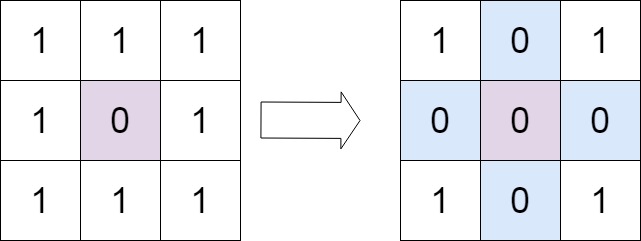LeetCode-in-All
73. Set Matrix Zeroes
Medium
Given an m x n integer matrix matrix, if an element is 0, set its entire row and column to 0’s, and return the matrix.
You must do it in place.
Example 1:

Input: matrix = [[1,1,1],[1,0,1],[1,1,1]]
Output: [[1,0,1],[0,0,0],[1,0,1]]
Example 2:

Input: matrix = [[0,1,2,0],[3,4,5,2],[1,3,1,5]]
Output: [[0,0,0,0],[0,4,5,0],[0,3,1,0]]
Constraints:
m == matrix.lengthn == matrix[0].length1 <= m, n <= 200-231 <= matrix[i][j] <= 231 - 1
Follow up:
- A straightforward solution using
O(mn)space is probably a bad idea. - A simple improvement uses
O(m + n)space, but still not the best solution. - Could you devise a constant space solution?
Solution
object Solution {
@SuppressWarnings(Array("scala:S3776"))
def setZeroes(matrix: Array[Array[Int]]): Unit = {
val m = matrix.length
val n = matrix(0).length
var row0 = false
var col0 = false
// Check if the 0th column needs to be marked as all 0s in the future
for (row <- matrix) {
if (row(0) == 0) {
col0 = true
}
}
// Check if the 0th row needs to be marked as all 0s in the future
for (i <- 0 until n) {
if (matrix(0)(i) == 0) {
row0 = true
}
}
// Store the signals in the 0th row and column
for (i <- 1 until m) {
for (j <- 1 until n) {
if (matrix(i)(j) == 0) {
matrix(i)(0) = 0
matrix(0)(j) = 0
}
}
}
// Mark 0 for all cells based on signals from the 0th row and 0th column
for (i <- 1 until m) {
for (j <- 1 until n) {
if (matrix(i)(0) == 0 || matrix(0)(j) == 0) {
matrix(i)(j) = 0
}
}
}
// Set the 0th column
for (i <- 0 until m) {
if (col0) {
matrix(i)(0) = 0
}
}
// Set the 0th row
for (i <- 0 until n) {
if (row0) {
matrix(0)(i) = 0
}
}
}
}

